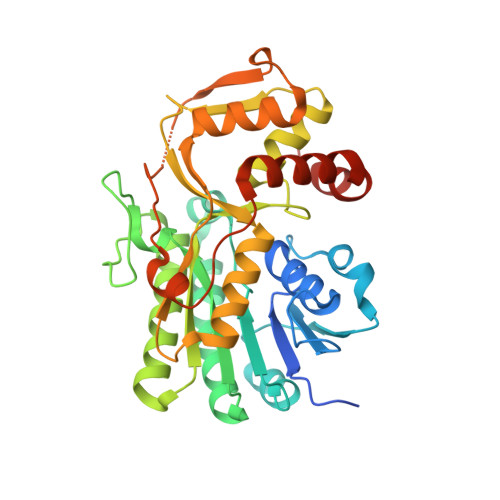EvdS6 is a bifunctional decarboxylase from the everninomicin gene cluster.
Dulin, C.C., Sharma, P., Frigo, L., Voehler, M.W., Iverson, T.M., Bachmann, B.O.(2023) J Biological Chem 299: 104893-104893
- PubMed: 37286037
- DOI: https://doi.org/10.1016/j.jbc.2023.104893
- Primary Citation of Related Structures:
8SHH, 8SK0 - PubMed Abstract:
The everninomicins are bacterially produced antibiotic octasaccharides characterized by the presence of two interglycosidic spirocyclic ortho-δ-lactone (orthoester) moieties. The terminating G- and H-ring sugars, L-lyxose and C-4 branched sugar β-D-eurekanate, are proposed to be biosynthetically derived from nucleotide diphosphate pentose sugar pyranosides; however, the identity of these precursors and their biosynthetic origin remain to be determined. Herein we identify a new glucuronic acid decarboxylase from Micromonospora belonging to the superfamily of short-chain dehydrogenase/reductase enzymes, EvdS6. Biochemical characterization demonstrated that EvdS6 is an NAD + -dependent bifunctional enzyme that produces a mixture of two products, differing in the sugar C-4 oxidation state. This product distribution is atypical for glucuronic acid decarboxylating enzymes, most of which favor production of the reduced sugar and a minority of which favor release of the oxidized product. Spectroscopic and stereochemical analysis of reaction products revealed that the first product released is the oxidatively produced 4-keto-D-xylose and the second product is the reduced D-xylose. X-ray crystallographic analysis of EvdS6 at 1.51 Å resolution with bound co-factor and TDP demonstrated that the overall geometry of the EvdS6 active site is conserved with other SDR enzymes and enabled studies probing structural determinants for the reductive half of the net neutral catalytic cycle. Critical active site threonine and aspartate residues were unambiguously identified as essential in the reductive step of the reaction and resulted in enzyme variants producing almost exclusively the keto sugar. This work defines potential precursors for the G-ring L-lyxose and resolves likely origins of the H-ring β-D-eurekanate sugar precursor.
- Department of Chemistry, Vanderbilt University, Nashville, Tennessee, USA.
Organizational Affiliation:


















